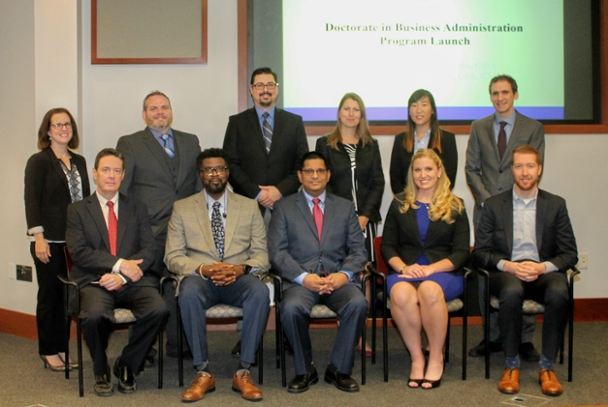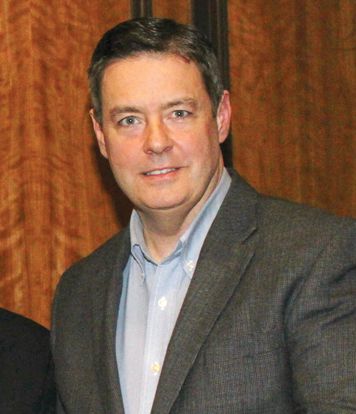Accounting, Ph.D.
Our rigorous research degree is designed to provide experienced professionals with the advanced skills and credentials required to secure and succeed in full-time, tenure-track faculty positions at accredited institutions.
The AACSB (Association to Advance Collegiate Schools of Business) named the DBA program among best practices in “Innovations and Best Practices in Canada, Latin America and the United States.” Just 43 colleges from the two continents were included in this publication that recognizes the “impactful ways” AACSB member schools are redefining business education.
Program Specific Admission Requirements
A candidate admitted into the program will be an experienced professional holding a masters degree with a strong interest and aptitude for teaching and producing the type of practice-relevant empirical research required to transition successfully into an academic career at an accredited institution.
Below please find our admissions guidelines.
- Normally, 5-10 years of meaningful practice experience.
- A master’s degree in business with a minimum 3.5 grade-point average.
- Normally, a recognized professional accounting certification (i.e. Certified Public Accountant, Certified Management Accountant, Certified Internal Auditor, Certified Fraud Examiner).
- Submission of a Statement of Interest.
- Three Professional References.
- Research Proposal (This proposal and instructions will be required after your initial application is reviewed)
For general application requirements, please Visit Our Admissions Webpage.
Curriculum
The AACSB Accredited Kania School of Management's Ph.D. program curriculum was designed to incorporate the recommendations and guidelines for executive doctorate programs provided by the Pathways Commission (a joint initiative of the American Institute of Certified Public Accountants and the American Accounting Association) and our accrediting body, the AACSB.
The curriculum is designed to progress student knowledge and skills in three phases: (1) foundational knowledge and skills (2) intermediate/advanced knowledge and skills (3) dissertation development and execution. The three phases are summarized below.
Phase I - Foundational
During this phase the student will achieve, demonstrate, and be assessed to ensure he/she has achieved learning outcomes in areas of:
- broad business theory (BUS 700),
- research process/approaches (BUS 701),
- academic governance (BUS 702),
- broad business literature (BUS 703),
- foundational research methods (BUS 704),
- and foundational Ignatian identity and mission of The University of Scranton (BUS 705).
Once the foundational learning outcomes have been provided, achieved, and assessed, the student proceeds to intermediate and advanced learning outcomes including:
- a deep investigation into the theories/constructs commonly used in the fraud behavior and auditing literature (ACC 706 and ACC 709),
- further investigation, reflection, and integration of Ignatian identity and mission of The University of Scranton into his/her research and teaching philosophy (BUS 708 and BUS 715),
- a mastery of intermediate and advanced research methods (BUS 707 and BUS 710),
- an investigation of business research published in practice journals resulting in a manuscript submission (ACC 711),
- and in-depth exposure to accounting instruction to ensure the student builds highly-effective instructional skills (ACC 713).
Upon the completion of these intermediate and advanced learning outcomes (including a comprehensive examination of the learning outcomes from the first four terms), the student advances to the dissertation phase of the curriculum.
Phase III-Dissertation
This phase requires the student to:
- identify practice-relevant research questions to be answered in his/her dissertation including a comprehensive review of the literature (ACC 712),
- prepare a comprehensive applied dissertation proposal including a literature review (building upon ACC 712),
- research design/constructs/hypothesis supported by theory, methods, discussion, including all data parameters/methodologies, a project plan and a public defense of his/her proposal to faculty (and others) at The University of Scranton (ACC 714),
- and formally execute his/her dissertation proposal project plan and provide ongoing and timely updates to the Dissertation Chair and Content Expert Scholar (both orally and in writing) with a particular focus on the his/her data collection and analysis concluding with a public defense of his/her dissertation to faculty (and others) at The University of Scranton (ACC 716, ACC 717, ACC 718)
For additional information on the curriculum, visit the Loading... Catalog.
A Degree in Demand
Beyond the Classroom

Strategic Advisor Named
George W. Krull, Jr., Ph.D., has been named global strategic advisor for the DBA program.

Small Program Cohort
Small cohort sizes to ensure individual attention and mentoring on each student’s development and research.
Graduate Education at Scranton
With over 30 programs The University of Scranton can help you to achieve your goals, personally and professionally. Find out what our students have to say about graduate education at Scranton.
Accreditation
The Ph.D. in Accounting program is housed in our AACSB International (Association to Advanced Collegiate Schools of Business) Accredited Kania School of Management. We are the only university in Northeastern Pennsylvania to receive this accreditation. Worldwide, only five percent of business schools are accredited by AACSB. AACSB accreditation is a seal of approval that reflects the quality of business school. It ensures that the students are learning relevant material; evaluation is done every five years including self-evaluations, peer reviews, committee reviews, faculty qualifications, and curriculum.
Mission Statement of the Ph.D. in Accounting Program
Meet the Program Director

Douglas Boyle, D.B.A., C.M.A., C.P.A.
Chairperson Associate Professor
B.S., The University of Scranton M.B.A., Columbia University D.B.A., Kennesaw State University
(570) 941-5436douglas.boyle@scranton.edu





